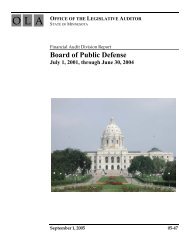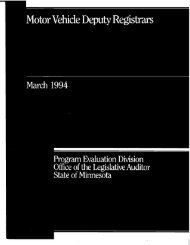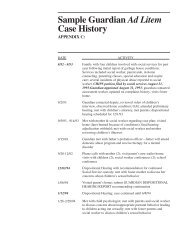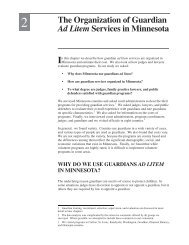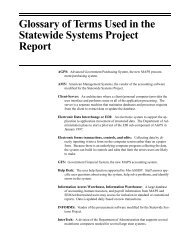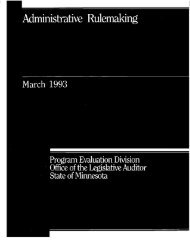Occupational Regulation - Office of the Legislative Auditor
Occupational Regulation - Office of the Legislative Auditor
Occupational Regulation - Office of the Legislative Auditor
Create successful ePaper yourself
Turn your PDF publications into a flip-book with our unique Google optimized e-Paper software.
68 OCCUPATIONAL REGULATION<br />
<strong>the</strong>re is a need to periodically re-examine <strong>the</strong> contemporary relevance <strong>of</strong><br />
regulatory programs, and <strong>the</strong> Chapter 214 criteria are a useful place to start.<br />
We recommend<br />
a review <strong>of</strong><br />
existing<br />
regulatory<br />
programs.<br />
Recognizing <strong>the</strong> possibility that some programs are out <strong>of</strong> date, some o<strong>the</strong>r states<br />
have enacted sunset laws that require periodic reviews <strong>of</strong> regulatory programs.<br />
However, as we discussed in Chapter 1, in many cases sunset laws have not<br />
rewarded <strong>the</strong> promise that led to <strong>the</strong>ir enactment. While sunset requirements have<br />
been repealed or scaled back in some states, <strong>the</strong>y are still credited with some<br />
modest successes. National analysts <strong>of</strong> occupational regulation still call for some<br />
form <strong>of</strong> sunset reviews, and many <strong>of</strong> <strong>the</strong> people we talked with believe <strong>the</strong>re is a<br />
need to take a fresh look at occupational regulation to see if regulatory<br />
requirements are still needed in all cases. 17<br />
Minnesota has more regulated occupations than most states, and Minnesota<br />
regulates some occupations that are regulated in few o<strong>the</strong>r states. Minnesota also<br />
has some very small occupations regulated by independent boards. While it is<br />
beyond <strong>the</strong> scope <strong>of</strong> this study to provide definitive answers, this section addresses<br />
<strong>the</strong> following questions:<br />
· Are <strong>the</strong>re occupations that do not have significant initial or continuing<br />
education, experience, or examination requirements and thus may not<br />
need to be regulated<br />
· Are some regulatory requirements inconsistent or out <strong>of</strong> date in terms<br />
<strong>of</strong> coverage Is <strong>the</strong>re a consistent use <strong>of</strong> terminology in regulation <strong>of</strong><br />
different occupations Are <strong>the</strong>re small or outdated regulatory boards<br />
that could be eliminated or consolidated<br />
· Is <strong>the</strong>re a way <strong>of</strong> reorganizing occupational regulation so that related<br />
occupations are located in <strong>the</strong> same agencies or o<strong>the</strong>rwise affiliated<br />
with o<strong>the</strong>r similar pr<strong>of</strong>essions or occupations.<br />
The Directory<br />
<strong>of</strong> Regulated<br />
Occupations we<br />
compiled can<br />
help focus this<br />
review.<br />
Education, Experience, and Examination<br />
Requirements<br />
A comprehensive review <strong>of</strong> <strong>the</strong> 188 regulated occupations is well beyond <strong>the</strong><br />
scope <strong>of</strong> this study. However, we have compiled a Directory <strong>of</strong> Regulated<br />
Occupations (published separately) that presents descriptive information on<br />
regulated occupations including data on <strong>the</strong> education, experience, and<br />
examination requirements for each occupation, <strong>the</strong> number <strong>of</strong> regulated<br />
pr<strong>of</strong>essionals, and <strong>the</strong> number and type <strong>of</strong> complaints filed against license holders.<br />
Analysis <strong>of</strong> this database could be a starting point for a review, or oversight<br />
hearings relating to occupational regulation.<br />
17 Kara Schmitt and Benjamin Shimberg, Demystifying <strong>Occupational</strong> and Pr<strong>of</strong>essional <strong>Regulation</strong>:<br />
Answers to Questions You My Have Been Afraid to Ask (Lexington, KY: Council on Licensure,<br />
Enforcement and <strong>Regulation</strong>, 1996), 19; Richard C. Kearney, “Sunset: A Survey and Analysis<br />
<strong>of</strong> <strong>the</strong> State Experience,” Public Administration Review, vol. 50 (January-February 1990), 56;<br />
and Finocchio et. al., Streng<strong>the</strong>ning Consumer Protection, 29-3.



